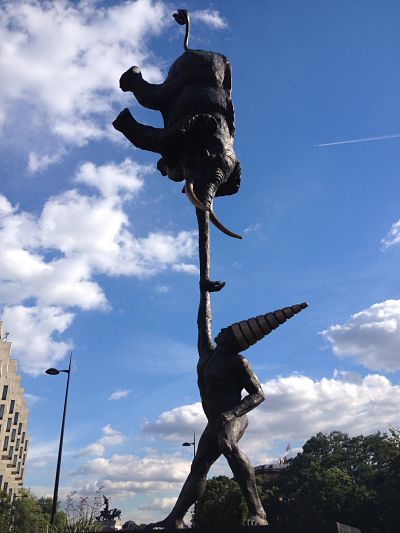L'Eléphant de la Bastille
4 participants
Page 1 sur 1
 L'Eléphant de la Bastille
L'Eléphant de la Bastille
Cet éléphant triomphal, ou Grand kiosque à la gloire du roi, est plutôt le projet d'un certain RIBART.
Il présente son projet dans ce Mémoire, en 1758, ICI
Voici quelques planches :




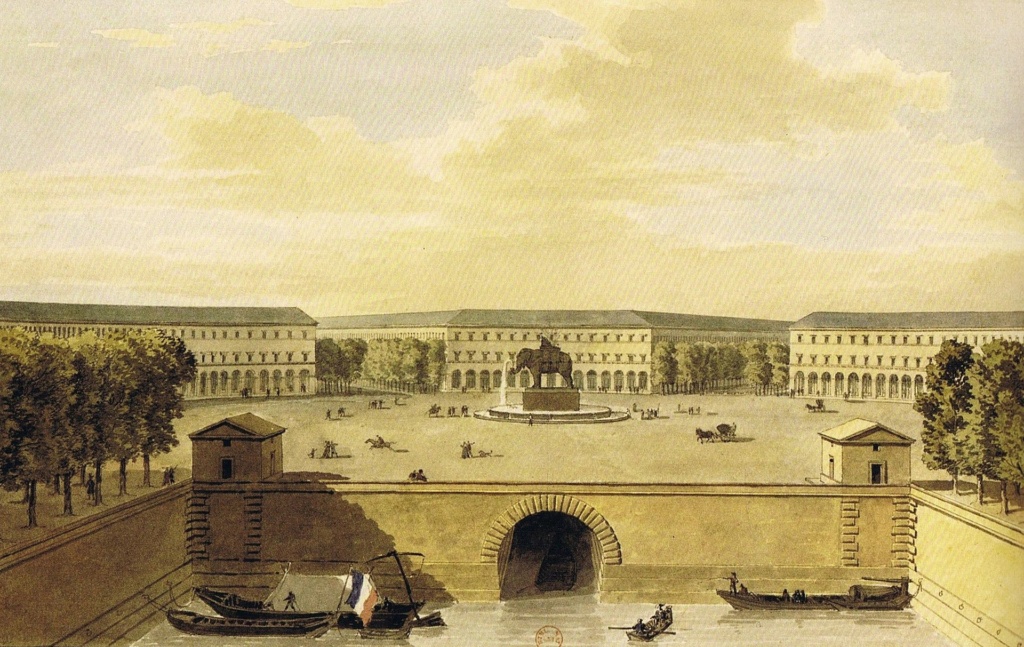
Projet d'aménagement de la place de la Bastille dans les années 1800
Image : Wikipedia

Etude pour l'éléphant de la Bastille (projet de fontaine). Projet initial de 1809
Proposition antérieure au projet final de Joseph-Antoine Alavoine.
Image : Wikipedia

Projet pour la fontaine de l'Éléphant de la Bastille, vers 1809-1810
Aquarelle de Jean-Antoine Alavoine, vers 1812-1813
L'aquarelle est contresignée par Vivant Denon et Alavoine (architecte du projet)
Musée du Louvre, Paris
Image : Wikipedia

Plans et coupes de la fontaine, selon le projet définitif
Louis Bruyère, Études relatives à l'art des constructions, t. XII (Mélanges), Paris, Bance aîné, 1828.
"Fontaine de la Bastille"
Image : Wikipedia

La fontaine de l'éléphant, projet d'Alavoine (vers 1813-1814).
Il s'agit probablement de la vue exposée au Salon de 1814, ou d'une chromolithographie de celle-ci (Paris, musée Carnavalet).
Image : Wikipedia
Le projet initial (en bronze) ne sera pas réalisé ; mais sa maquette en plâtre (à l'échelle), exposée à divers endroits sur la place, deviendra célèbre notamment grâce à Victor Hugo et son romanLes Misérables.
Le personnage de Gavroche loge dans cette structure...

La maquette en plâtre dans son hangar en 1830
Augustus Charles Pugin Fenner Sears J. Nash
Image : The Brown University Library / Wikipedia
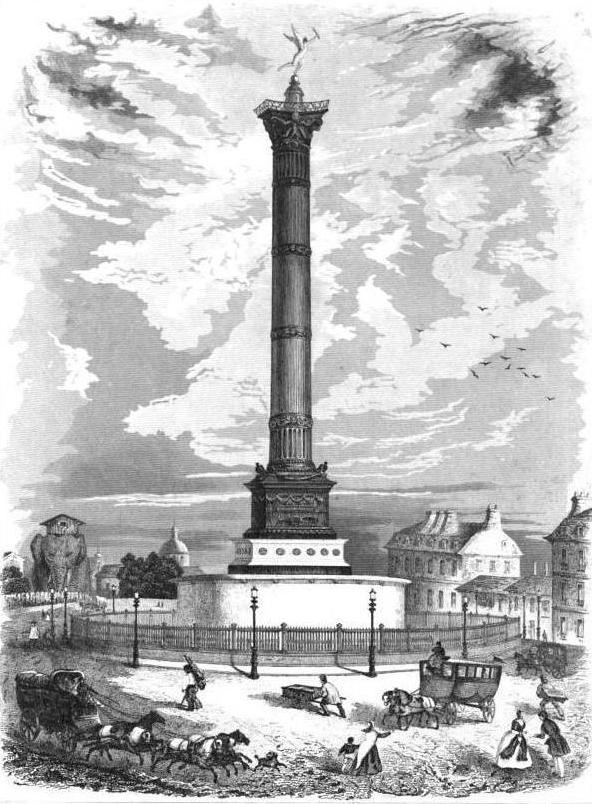
Vue de la place de la Bastille (depuis le Nord), en 1842.
On y voit la colonne de Juillet, inaugurée en 1840, et l'éléphant (à l'arrière-plan, à gauche).
Réville (dessin et gravure) — Germain Sarrut et B. Saint-Edme (dir.), Paris pittoresque, nouvelle édition, t. I, Paris, 1842.
Image : Wikipedia
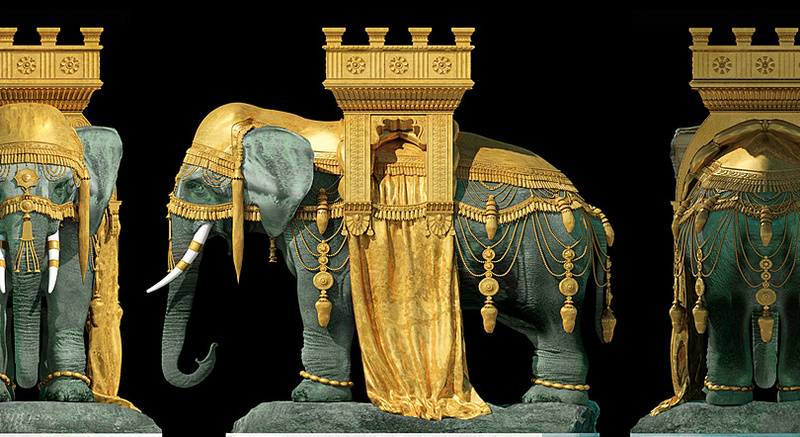
Reconstitution 3D de l'éléphant de la Bastille par Hubert Naudeix :copyright:Aristeas
Dernière édition par La nuit, la neige le Mer 19 Juin 2019, 19:40, édité 3 fois
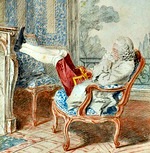
La nuit, la neige- Messages : 18132
Date d'inscription : 21/12/2013
 Re: L'Eléphant de la Bastille
Re: L'Eléphant de la Bastille
J'ai bien tout de suite pensé à Napoléon et Hugo, mais j'ignorais totalement Charles-François Ribart de Chamoust ! 
Tu me le fais découvrir .

Tu me le fais découvrir .
_________________
... demain est un autre jour .
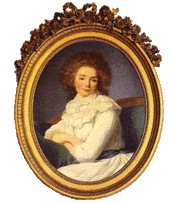
Mme de Sabran- Messages : 55497
Date d'inscription : 21/12/2013
Localisation : l'Ouest sauvage
 L'Eléphant de la Bastille, de Ribart de Chamoust
L'Eléphant de la Bastille, de Ribart de Chamoust
La nuit, la neige a écrit: sa maquette en plâtre (à l'échelle) deviendra célèbre notamment grâce à Victor Hugo et son non moins monumental Les Misérables : le personnage de Gavroche loge dans cette réplique.
Dans cet angle désert et découvert de la place, le large front du colosse, sa trompe, ses défenses, sa tour, sa croupe énorme, ses quatre pieds pareils à des colonnes faisaient, la nuit, sur le ciel étoilé, une silhouette surprenante et terrible.On ne savait ce que cela voulait dire. C'était une sorte de symbole de la force populaire. C'était sombre, énigmatique et immense.C'était on ne sait quel fantôme puissant, visible et debout à côté du spectre invisible de Bastille .
( Victor Hugo, Les Misérables )

_________________
... demain est un autre jour .

Mme de Sabran- Messages : 55497
Date d'inscription : 21/12/2013
Localisation : l'Ouest sauvage
 Re: L'Eléphant de la Bastille
Re: L'Eléphant de la Bastille
Une petite vidéo fait le tour de la question . :;;::,:!!!ùùù:
_________________

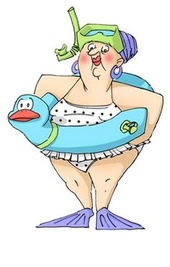
Comtesse Diane- Messages : 7397
Date d'inscription : 21/12/2013
Localisation : TOURAINE
 Re: L'Eléphant de la Bastille
Re: L'Eléphant de la Bastille
Dommage que ce projet n'ait pas abouti, non ? 
Cela change des innombrables phallus en métal ou pierre dressés ici ou là dans Paris... :

Cela change des innombrables phallus en métal ou pierre dressés ici ou là dans Paris... :


La nuit, la neige- Messages : 18132
Date d'inscription : 21/12/2013
 Re: L'Eléphant de la Bastille
Re: L'Eléphant de la Bastille
Comtesse Diane a écrit:Une petite vidéo fait le tour de la question . :;;::,:!!!ùùù:
Merci, chère Comtesse .
C'est curieux, je n'ai pas entendu mentionner ce monsieur Ribart de Chamoust ...
Pauvre éléphant, que de tribulations pour ne finalement aboutir à rien ! boudoi29
Sans Victor Hugo et Gavroche, il serait totalement tombé dans l'oubli .
_________________
... demain est un autre jour .

Mme de Sabran- Messages : 55497
Date d'inscription : 21/12/2013
Localisation : l'Ouest sauvage
 Re: L'Eléphant de la Bastille
Re: L'Eléphant de la Bastille
Itou.Mme de Sabran a écrit:J'ai bien tout de suite pensé à Napoléon et Hugo, mais j'ignorais totalement Charles-François Ribart de Chamoust !
Tu me le fais découvrir .
Hugo !
Gavroche= éléphant
Monsieur Madeleine = Montreuil / mer (il n'a fait qu'y passer et pourtant ....)
 Re: L'Eléphant de la Bastille
Re: L'Eléphant de la Bastille
Voici Gavroche surgissant de son éléphant ! :n,,;::::!!!:
Stupeur ! : Ce Poulbot speaks angliche !
Ce Poulbot speaks angliche !
Stupeur ! :
 Ce Poulbot speaks angliche !
Ce Poulbot speaks angliche ! _________________
... demain est un autre jour .

Mme de Sabran- Messages : 55497
Date d'inscription : 21/12/2013
Localisation : l'Ouest sauvage
 Re: L'Eléphant de la Bastille
Re: L'Eléphant de la Bastille
Mme de Sabran a écrit:
Stupeur ! :Ce Poulbot speaks angliche !
C'était avant le brexit . boudoi26
_________________


Comtesse Diane- Messages : 7397
Date d'inscription : 21/12/2013
Localisation : TOURAINE
 Re: L'Eléphant de la Bastille
Re: L'Eléphant de la Bastille
_________________
... demain est un autre jour .

Mme de Sabran- Messages : 55497
Date d'inscription : 21/12/2013
Localisation : l'Ouest sauvage

Comtesse Diane- Messages : 7397
Date d'inscription : 21/12/2013
Localisation : TOURAINE
 Re: L'Eléphant de la Bastille
Re: L'Eléphant de la Bastille
... mouais ! ça ne trompe personne . 

_________________
... demain est un autre jour .

Mme de Sabran- Messages : 55497
Date d'inscription : 21/12/2013
Localisation : l'Ouest sauvage

La nuit, la neige- Messages : 18132
Date d'inscription : 21/12/2013
 Re: L'Eléphant de la Bastille
Re: L'Eléphant de la Bastille
Nous nous éloignons de la première moitié du XIXe siècle qui a concerné les projets de l'édification d'un éléphant monumental en bronze, place de la Bastille, mais force est de constater que cet éléphant marquait encore les esprits quelques décennies plus tard.
La "maquette" en plâtre, longtemps exposée place de la Bastille, fut détruite en 1846.
Dommage qu'aucun des projets n'ait jamais abouti !
 Présenté prochainement en vente aux enchères...
Présenté prochainement en vente aux enchères... 
- A FRENCH ORMOLU AND CUT-CRYSTAL, BLOWN AND FROSTED-GLASS LIQUEUR-CASKET
BY COMPAGNIE DES CRISTALLERIES DE BACCARAT,
PARIS, CIRCA 1878
The frosted glass elephant surmounted by a draped cupola with a hinged compartment fitted with gilt-embossed glass stoppered bottles in a removable stand, the elephant in full headdress, the saddle hung with ropes and hooks holding twelve gilt-embossed glass cups, on a chamfered 'diamond' cut plinth, on a gadrooned moulded base with bracket feet and applied at the sides with Ganesh elephant mask handles, the decanters and cups modern replacements marked 'BACCARAT FRANCE', the tail replaced
25 ½ in. (65 cm. high); 22 ¾ in. (58 cm. wide); 9 ½ in. (24 cm.) deep
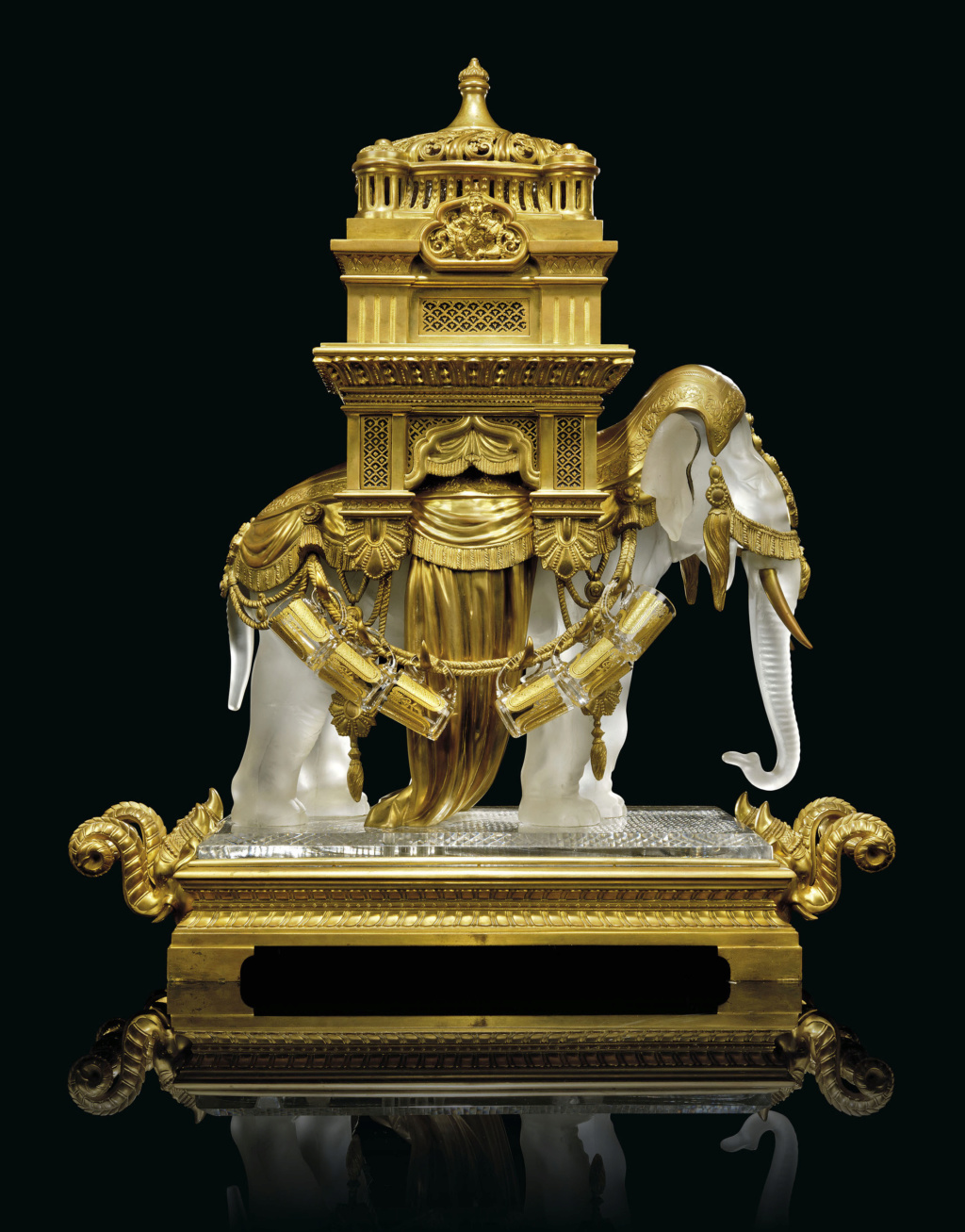
Image : Christie's
Lot Essay (extraits)
The model for this cave à liquor was first exhibited at the 1878 Exposition Universelle.
As the only example to have been positively identified by the Baccarat Factory as period, the present lot is an exceptionally rare work by the world-renowned cristallerie firm (sold Sotheby's, London, 8 July 2015, lot 46, £485,000 inc. premium).
A distinguishing feature of this nineteenth-century example is its complex construction and only one other example, commissioned slightly later circa 1920 for the for the Maharaja of Baroda in honour of the Elephant Festival in India, is similar in its technical characteristics.
Between 1982 and 2004 Baccarat revived the popular model in a limited series of re-editions, and it is important to note that these examples vary significantly in structure, which is discussed in further detail below.
Among these later editions is an example in the collection of the Hôtel Crillon, which was once believed to be the same cave à liquor exhibited at the 1878 Exhibition.
The Hôtel Crillon model now having been determined to be of a later date, it is therefore possible that the present lot is in fact the original 1878 example.

Image : Christie's
BACCARAT AND THE 1878 EXPOSITION
Held only eight years following France’s devastating defeat in the Franco-Prussian War, the 1878 Exposition Universelle served as a rallying moment for the recently established French Republic. As call to the nations of the world to display their cultural and mechanical achievements, the exhibition served as a platform for French artisans to showcase France's great advancements in both Industry and Art.
Nowhere is this more evident than with Baccarat’s show-stopping stand.
Since its founding by royal decree of Louis XV in 1764 through to the present day, Baccarat has been a technological innovator.
The company’s origins lay in a desire for France to compete with its European rivals in the delicate and complex field of crystal making. The factory was built in the Lorraine town of Baccarat whose name the firm would ultimately assume after a series of acquisitions and organizational changes in the 19th century.
In 1816, Aimé-Gabriel d’Artigues acquired the manufactory at Baccarat and oversaw the operation of its first oven for the creation of crystal, a material distinguished from glass by its density, durability and its highly reflective qualities, and for which the firm would become world renowned.
However, it was not until 1841 when François-Eugène de Fontenay joined the firm that true innovation began.
For it was de Fontenay who discovered that by the addition of nickel oxide in the manufacturing process, a perfectly clear product, "crystal glass", free of discolouration and imitating precious rock crystal, was produced. Shortly thereafter in 1844 the Baccarat company was awarded a Gold Medal at the French Expositions des Produits de l'Industrie.
Building on their prowess as industry leaders, Baccarat continued to innovate, developing ever more creative and technologically complex forms for their chandeliers, candelabra, and table decoration. The cristallerie’s stand at the 1878 Exposition was no exception.
(...)
It was in this context that the cave à liquor Élephant was first presented in 1878.
“A liqueur cabinet in the form of an elephant, more bizarre than elegant,” wrote one unconvinced contemporary critic.
Indeed, the fabulous model was a completely unique work, created with the most cutting-edge technology and born out of a fascination with the Orient.

Image : Christie's
INNOVATION AND IMAGINATION
The original design for the cave à liquor Élephant model designed for the exhibition is incredibly technically complex in construction, as evidenced by the present lot. The elephant itself was produced in several moulded sections of crystal glass. The front and rear of the elephant were each cast as two separate and hollow parts.
This open interior thus allowed for sections to be joined through the skilful assembly rods and nuts, all of which are hidden by the ruched drapery descending from cupola-form liqueur-casket.

Image : Christie's
The ears were also moulded separately, the seams covered by the headdress.
The glass was then frosted, a technique which purposefully dulls the brilliance of the glass. In the case of the present model this was achieved with an acid bath, and then polished, ultimately creating a striking contrast to the warm shine of the ormolu.
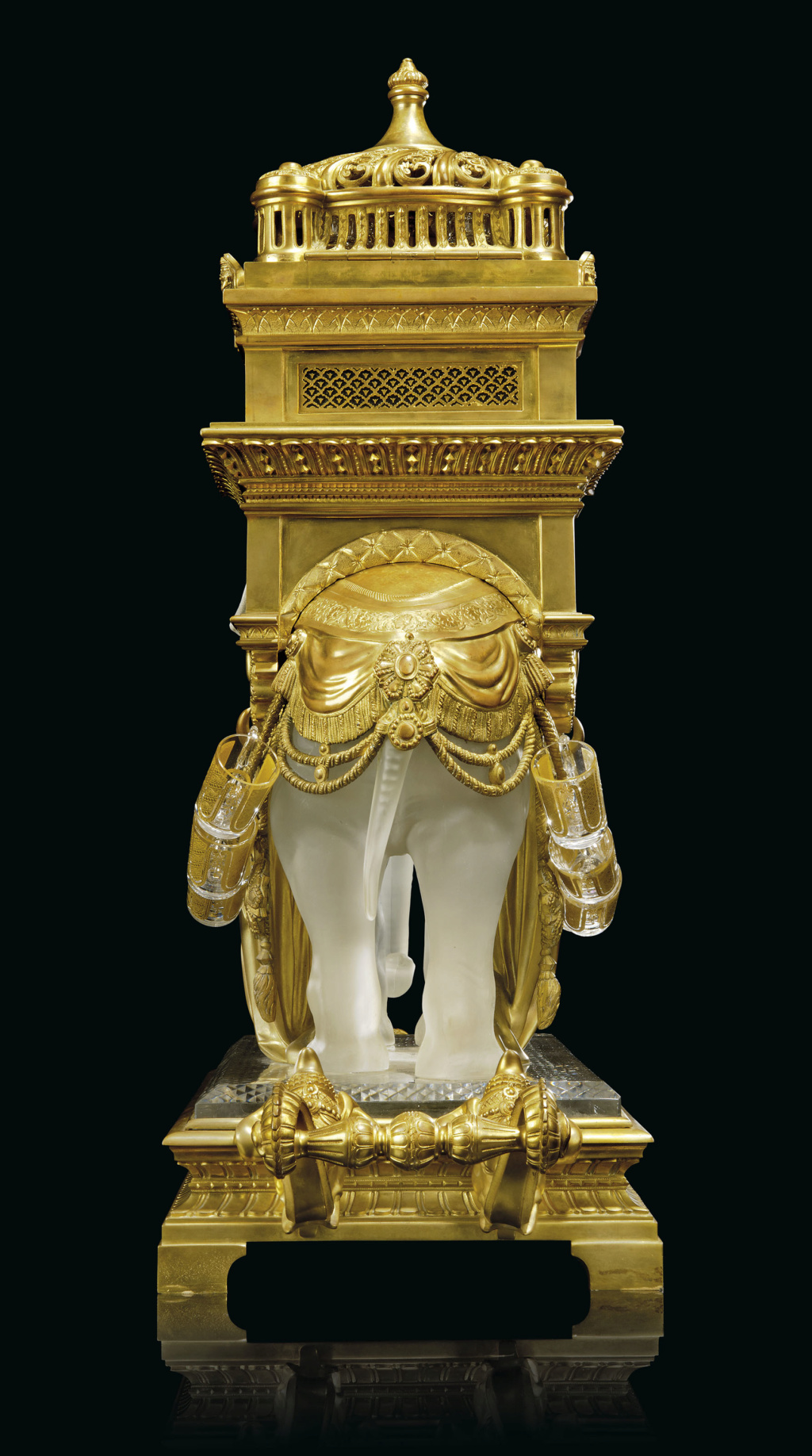

Images : Christie's
It is significant to note that the elephants in the later 1982-2004 editions were made in one piece (the full body and ears moulded together) and the bronze and diamond-cut plinths are often signed ‘Baccarat’, which is not the case with the present example. This information was researched with the kind assistance of Mme Michaela Lerch, Curator/ Head of Heritage Department Baccarat.
This precise technical construction of the original model is juxtaposed with the design's the fantastical interpretation of the Orient.
Orientalism, a Western preoccupation with the exoticism of the Middle and Far East, served as a motif in fine art since the beginning of the 19th century and which became progressively more of an influence on the decorative arts as the century went on.
The model for the present elephant was particularly inspired by the “éléphant de la Bastille”, a monumental fountain commissioned by Napoleon I in 1808 on the fourth anniversary of his coronation designed, in various iterations, by architect Jean-Antoine Alavoine (1778-1834).

Image : Christie's
The fountain was originally intended to be cast in the bronze from the melted down guns captured following Napoleon’s victorious Battle of Freidland and to be placed on the site of the fallen Bastille.
It is unclear why an elephant was the desired form of the monument, but it did replace another Orientalist work : the Egyptian-inspired “Fountain of Regeneration” in the form of Isis, which was a temporary plaster version.
Following Napoleon’s defeat at Waterloo the project was eventually abandoned, but its life-size wood and plaster model (which stood over 24 meters high), remained displayed on la place de la Bastille until 1847.
Although similarly ephemeral like the fountain before it, the model was forever immortalized by Victor Hugo in his novel Les Misérables as shelter for the character Gavroche.
Within the same Orientalist vein, Baccarat also presented at the 1878 exhibition a brûle parfum in the form of a camel. Entitled Le Vaisseau du desert, the model was incredibly refined in both technique and form.
Similar to the cave à liquor Éléphant in its rarity, only two versions were made. Appealing to the growing public interest in Orientalist objets another, less rare, model of the Baccarat elephant was produced several years later circa 1880, which veered more towards Japonsime in inspiration.
Rather than supporting a cupola, the Vase éléphant was modelled supporting a vase decorated with Japanese motifs. Smaller in scale, the figure of the elephant and the base made entirely of gilt and patinated-bronze and ultimately designed for a different level of clientele than for this exceptional cave à liquor, which stands unparalleled as a ground breaking objet de curiosité of French industrial art.
* Source et infos complémentaires : Christie's London - The Exceptional Sale, 4 July 2019
La "maquette" en plâtre, longtemps exposée place de la Bastille, fut détruite en 1846.
Dommage qu'aucun des projets n'ait jamais abouti !

- A FRENCH ORMOLU AND CUT-CRYSTAL, BLOWN AND FROSTED-GLASS LIQUEUR-CASKET
BY COMPAGNIE DES CRISTALLERIES DE BACCARAT,
PARIS, CIRCA 1878
The frosted glass elephant surmounted by a draped cupola with a hinged compartment fitted with gilt-embossed glass stoppered bottles in a removable stand, the elephant in full headdress, the saddle hung with ropes and hooks holding twelve gilt-embossed glass cups, on a chamfered 'diamond' cut plinth, on a gadrooned moulded base with bracket feet and applied at the sides with Ganesh elephant mask handles, the decanters and cups modern replacements marked 'BACCARAT FRANCE', the tail replaced
25 ½ in. (65 cm. high); 22 ¾ in. (58 cm. wide); 9 ½ in. (24 cm.) deep

Image : Christie's
Lot Essay (extraits)
The model for this cave à liquor was first exhibited at the 1878 Exposition Universelle.
As the only example to have been positively identified by the Baccarat Factory as period, the present lot is an exceptionally rare work by the world-renowned cristallerie firm (sold Sotheby's, London, 8 July 2015, lot 46, £485,000 inc. premium).
A distinguishing feature of this nineteenth-century example is its complex construction and only one other example, commissioned slightly later circa 1920 for the for the Maharaja of Baroda in honour of the Elephant Festival in India, is similar in its technical characteristics.
Between 1982 and 2004 Baccarat revived the popular model in a limited series of re-editions, and it is important to note that these examples vary significantly in structure, which is discussed in further detail below.
Among these later editions is an example in the collection of the Hôtel Crillon, which was once believed to be the same cave à liquor exhibited at the 1878 Exhibition.
The Hôtel Crillon model now having been determined to be of a later date, it is therefore possible that the present lot is in fact the original 1878 example.

Image : Christie's
BACCARAT AND THE 1878 EXPOSITION
Held only eight years following France’s devastating defeat in the Franco-Prussian War, the 1878 Exposition Universelle served as a rallying moment for the recently established French Republic. As call to the nations of the world to display their cultural and mechanical achievements, the exhibition served as a platform for French artisans to showcase France's great advancements in both Industry and Art.
Nowhere is this more evident than with Baccarat’s show-stopping stand.
Since its founding by royal decree of Louis XV in 1764 through to the present day, Baccarat has been a technological innovator.
The company’s origins lay in a desire for France to compete with its European rivals in the delicate and complex field of crystal making. The factory was built in the Lorraine town of Baccarat whose name the firm would ultimately assume after a series of acquisitions and organizational changes in the 19th century.
In 1816, Aimé-Gabriel d’Artigues acquired the manufactory at Baccarat and oversaw the operation of its first oven for the creation of crystal, a material distinguished from glass by its density, durability and its highly reflective qualities, and for which the firm would become world renowned.
However, it was not until 1841 when François-Eugène de Fontenay joined the firm that true innovation began.
For it was de Fontenay who discovered that by the addition of nickel oxide in the manufacturing process, a perfectly clear product, "crystal glass", free of discolouration and imitating precious rock crystal, was produced. Shortly thereafter in 1844 the Baccarat company was awarded a Gold Medal at the French Expositions des Produits de l'Industrie.
Building on their prowess as industry leaders, Baccarat continued to innovate, developing ever more creative and technologically complex forms for their chandeliers, candelabra, and table decoration. The cristallerie’s stand at the 1878 Exposition was no exception.
(...)
It was in this context that the cave à liquor Élephant was first presented in 1878.
“A liqueur cabinet in the form of an elephant, more bizarre than elegant,” wrote one unconvinced contemporary critic.
Indeed, the fabulous model was a completely unique work, created with the most cutting-edge technology and born out of a fascination with the Orient.

Image : Christie's
INNOVATION AND IMAGINATION
The original design for the cave à liquor Élephant model designed for the exhibition is incredibly technically complex in construction, as evidenced by the present lot. The elephant itself was produced in several moulded sections of crystal glass. The front and rear of the elephant were each cast as two separate and hollow parts.
This open interior thus allowed for sections to be joined through the skilful assembly rods and nuts, all of which are hidden by the ruched drapery descending from cupola-form liqueur-casket.

Image : Christie's
The ears were also moulded separately, the seams covered by the headdress.
The glass was then frosted, a technique which purposefully dulls the brilliance of the glass. In the case of the present model this was achieved with an acid bath, and then polished, ultimately creating a striking contrast to the warm shine of the ormolu.


Images : Christie's
It is significant to note that the elephants in the later 1982-2004 editions were made in one piece (the full body and ears moulded together) and the bronze and diamond-cut plinths are often signed ‘Baccarat’, which is not the case with the present example. This information was researched with the kind assistance of Mme Michaela Lerch, Curator/ Head of Heritage Department Baccarat.
This precise technical construction of the original model is juxtaposed with the design's the fantastical interpretation of the Orient.
Orientalism, a Western preoccupation with the exoticism of the Middle and Far East, served as a motif in fine art since the beginning of the 19th century and which became progressively more of an influence on the decorative arts as the century went on.
The model for the present elephant was particularly inspired by the “éléphant de la Bastille”, a monumental fountain commissioned by Napoleon I in 1808 on the fourth anniversary of his coronation designed, in various iterations, by architect Jean-Antoine Alavoine (1778-1834).

Image : Christie's
The fountain was originally intended to be cast in the bronze from the melted down guns captured following Napoleon’s victorious Battle of Freidland and to be placed on the site of the fallen Bastille.
It is unclear why an elephant was the desired form of the monument, but it did replace another Orientalist work : the Egyptian-inspired “Fountain of Regeneration” in the form of Isis, which was a temporary plaster version.
Following Napoleon’s defeat at Waterloo the project was eventually abandoned, but its life-size wood and plaster model (which stood over 24 meters high), remained displayed on la place de la Bastille until 1847.
Although similarly ephemeral like the fountain before it, the model was forever immortalized by Victor Hugo in his novel Les Misérables as shelter for the character Gavroche.
Within the same Orientalist vein, Baccarat also presented at the 1878 exhibition a brûle parfum in the form of a camel. Entitled Le Vaisseau du desert, the model was incredibly refined in both technique and form.
Similar to the cave à liquor Éléphant in its rarity, only two versions were made. Appealing to the growing public interest in Orientalist objets another, less rare, model of the Baccarat elephant was produced several years later circa 1880, which veered more towards Japonsime in inspiration.
Rather than supporting a cupola, the Vase éléphant was modelled supporting a vase decorated with Japanese motifs. Smaller in scale, the figure of the elephant and the base made entirely of gilt and patinated-bronze and ultimately designed for a different level of clientele than for this exceptional cave à liquor, which stands unparalleled as a ground breaking objet de curiosité of French industrial art.
* Source et infos complémentaires : Christie's London - The Exceptional Sale, 4 July 2019

La nuit, la neige- Messages : 18132
Date d'inscription : 21/12/2013
 Re: L'Eléphant de la Bastille
Re: L'Eléphant de la Bastille
La nuit, la neige a écrit:
Dommage qu'aucun des projets n'ait jamais abouti !
C'est vrai !
Mais, en même temps, ce pachyderme géant en plein Paris eût été un tantinet cocasse ...

_________________
... demain est un autre jour .

Mme de Sabran- Messages : 55497
Date d'inscription : 21/12/2013
Localisation : l'Ouest sauvage
 Sujets similaires
Sujets similaires» La prison forteresse de la Bastille et ses environs
» 14 juillet 1789 : la prise de la Bastille
» Les Amants de la Bastille
» Les fresques du métro Bastille
» Le Musée Carnavalet, Paris.
» 14 juillet 1789 : la prise de la Bastille
» Les Amants de la Bastille
» Les fresques du métro Bastille
» Le Musée Carnavalet, Paris.
Page 1 sur 1
Permission de ce forum:
Vous ne pouvez pas répondre aux sujets dans ce forum



